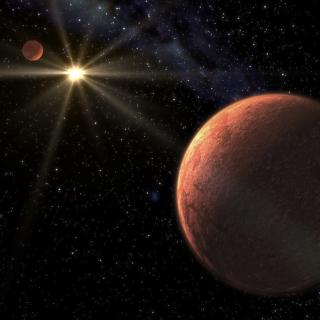Bibcode
Boudreault, S.; Lodieu, N.
Referencia bibliográfica
Monthly Notices of the Royal Astronomical Society, Volume 434, Issue 1, p.142-147
Fecha de publicación:
9
2013
Número de citas
12
Número de citas referidas
11
Descripción
We have obtained a low-resolution optical spectrum for one of the
faintest cluster member candidates in Praesepe with the Optical System
for Imaging and low Resolution Integrated Spectroscopy mounted on the
10.4 m Gran Telescopio de Canarias. We confirm spectroscopically the
first L dwarf member in Praesepe, UGCS J084510.66+214817.1. We derived
an optical spectral type of L0.3±0.4 and estimated its effective
temperature to Teff = 2279 ± 371 K and a mass of 71.1
± 23.0 MJup, according to state-of-the-art models,
placing it at the hydrogen-burning boundary. We measured the equivalent
width of the gravity-sensitive sodium doublet at 8182/8194 Å,
which adds credit to the membership of this new L dwarf to Praesepe. We
also derived a probability of ˜20.5 per cent that our candidate
would be a field L0 dwarf. We conclude that this object is likely to be
a true member of Praesepe, with evidence of being a binary system.
Proyectos relacionados

Estrellas de Baja Masa, Enanas Marrones y Planetas
Se investigan los procesos que conducen a la formación de estrellas de baja masa, enanas marrones y exoplanetas y caracterizar las propiedades físicas de estos astros en varias etapas evolutivas. Las estrellas de muy baja masa y las enanas marrones son probablemente los objetos más numerosos de nuestra Galaxia, pero no por ello están
Rafael
Rebolo López